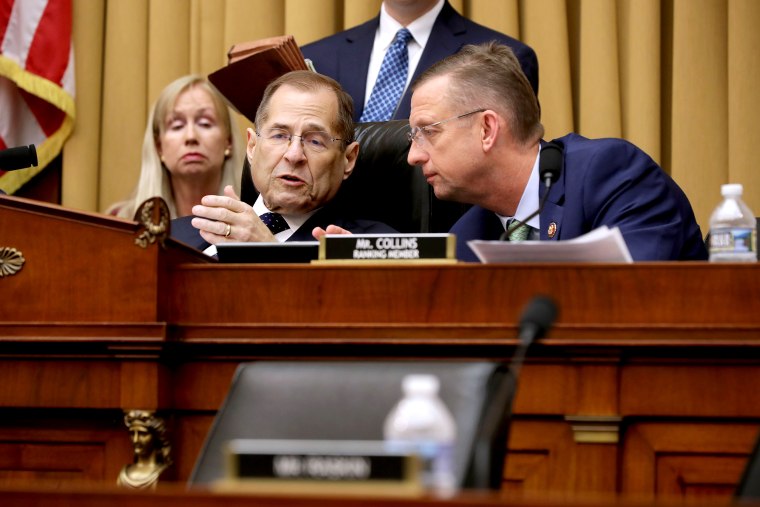The top Democrat and Republican on the House Judiciary Committee sent a detailed letter on Monday to the head of the federal prisons bureau demanding answers about the circumstances of Jeffrey Epstein's death while in custody.
Chairman of the House Judiciary Committee Jerry Nadler, D-N.Y., and Ranking Member Doug Collins, R-Ga., sent a letter to Hugh Hurwitz, the acting director of the Bureau of Prisons, requesting answers to 23 questions about the agency's intake protocol and suicide prevention program for inmates after Epstein was found dead by apparent suicide in his cell on Saturday.
"The apparent suicide of this high-profile and—if allegations are proven to be accurate—particularly reprehensible individual while in the federal government’s custody demonstrates severe miscarriages of or deficiencies in inmate protocol and has allowed the deceased to ultimately evade facing justice," the two lawmakers said, adding that they also have concerns about justice for Epstein's alleged victims.
"Any victims of Mr. Epstein’s actions will forever be denied proper recourse and the scintilla of recompense our justice system can provide in the face of such alleged atrocities; the competency and rigor of our criminal justice system has been marred by this apparent oversight."
The two lawmakers demanded to know how the bureau implements its suicide prevention program, if Epstein's mental health was evaluated during the intake process, how he was housed, why he was taken off of suicide watch, the number of correctional officers assigned to monitor him and the frequency and nature of check-ins, among other questions. Hurwitz has until August 21 to respond.
Epstein, 66, was in his federal jail cell at the Metropolitan Correctional Center in New York and was found unresponsive at around 6:30 a.m. ET. on Saturday. He was not on suicide watch at the time of his death. Authorities are treating it as an apparent suicide.
Attorney General William Barr said he was "appalled" at the situation and said he has consulted with the Justice Department's inspector general, who is opening an investigation into the circumstances. "Mr. Epstein's death raises serious questions that must be answered," Barr said.
Epstein's death after he was found injured in a fetal position and semiconscious with marks on his neck roughly two weeks ago at the federal prison in Manhattan. Epstein was placed on suicide watch but later taken off and placed in a special housing unit. The FBI is also opening an investigation into the circumstances surrounding his death.
Corrections officers in Epstein's housing unit are supposed to check on inmates every 30 minutes or so, but a source familiar with the investigation told NBC News that "a number of hours" elapsed between checks of Epstein's cell.
Epstein was arrested July 6 in Teterboro, New Jersey, and was charged with one count of sex trafficking conspiracy and one count of sex trafficking. Other lawmakers on both sides have also demanded answers from prison and justice department officials.

